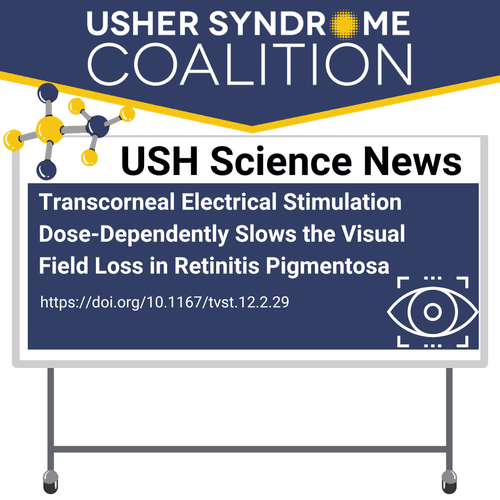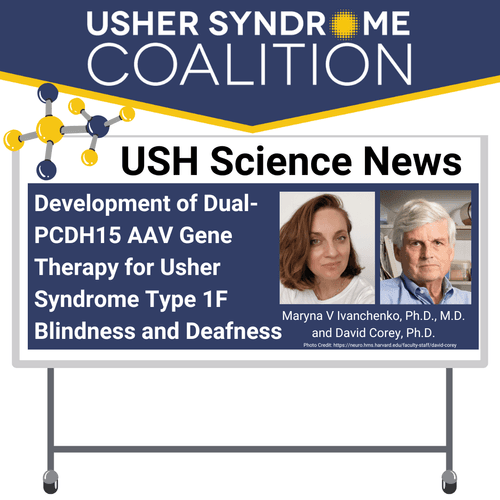Grounded in Science
A balance of research news and well-being for the Usher syndrome community.
Happy April! If you’re new here, the Usher Syndrome Coalition is the core of the global Usher syndrome community, working to connect those living with Usher syndrome to resources, research, and each other. The Coalition uses the power of two data collection tools to build the Usher syndrome community, leading to a better understanding of Usher syndrome, improved quality of life, and treatments for hearing, vision, and balance issues associated with Usher.
The USH Trust is the largest international contact database of individuals with Usher syndrome, and our most powerful tool to connect, inform, and support individuals within the Usher community. Those who join the USH Trust are also the first to learn about the latest research opportunities.
Usher Syndrome Data Collection Program
Individuals with Usher syndrome who are passionate about research are invited to join the Usher Syndrome Data Collection Program, or USH DCP, powered by RARE-X. Health information entered into this secure platform will become part of a global database of de-identified information available to researchers worldwide. As the DCP grows, more researchers will become aware of Usher syndrome, leading to the development of clinical trials and treatments for the vision loss, hearing loss, and balance issues associated with Usher syndrome.
Have you joined the Usher Syndrome Coalition Discord Community Server? It’s a safe place for the community to connect with each other.
Join here: https://discord.gg/czwHGaDu7W
Research Spotlight
Transcorneal Electrical Stimulation Dose-Dependently Slows the Visual Field Loss in Retinitis Pigmentosa
This publication outlines a study of transcorneal electrical stimulation (TcES) as a means to slow the progression of visual field loss in patients with retinitis pigmentosa (RP). Although the exact mechanism of action is not known, it is thought that the treatment may work by suppressing inflammatory responses caused by the damaged rods in the retina. The study was designed to test whether the treatment slows retinal disease progression.
What this means for Usher syndrome: The authors conclude that TcES may be an effective and safe method to slow RP progression, thus showing promise as a clinically viable treatment for RP.
Read our full summary on our website here
DISCLAIMER: The Usher Syndrome Coalition does not provide medical advice nor promote treatment methods. USH Science News is intended to help summarize more complex literature for the community to use at their own discretion.
For more, check out our Current USH Research page specific to USH subtype as well as gene-independent therapeutic approaches.
In Case You Missed It: Science News Feature
Corey Laboratory's work to develop treatments for Usher syndrome type 1F
We summarized how David Corey, Ph.D. and Maryna Ivanchenko, Ph.D., M.D. at Harvard University have been working to develop treatments for Usher syndrome type 1F. In June 2022, they published an ARVO paper titled "Development of Dual-PCDH15 AAV Gene Therapy for Usher Syndrome Type 1F Blindness and Deafness."
In this paper, they explain how gene therapy is an attractive therapeutic approach for USH1F, however, the gene that causes this subtype, PCDH15, is too large to be used in a single AAV vector model. They were able to successfully show that "mice treated with dual AAVs encoding PCDH15 demonstrated good hearing rescue" (Ivanchenko, et al. 2022).
Dr. Corey's goal is to rescue vision, but he is testing first on hearing because it’s easier to measure in a mouse model. Because babies with Usher 1 are born profoundly deaf but sighted, researchers believe that the hearing is more sensitive to the absence of the protein than vision. Therefore, if a gene therapy rescues hearing, theoretically, it should also rescue vision.
The Corey Laboratory continues to produce exciting research on gene therapies for USH1F that could one day allow for treatment models for other Usher syndrome subtypes. Read more about the various research projects at the Corey Lab here: https://corey.med.harvard.edu/
Watch Dr. Corey's presentation on his mini-gene here: https://bit.ly/USH1Fminigene
For more science news, check out our Science News page, organized by treatment approach and type of Usher syndrome.
On Well-Being: Challenge Accepted
For someone with Usher syndrome, there are very real barriers and limitations to choosing a career that also brings a sense of purpose. But the barriers may not be as limiting as you think...
USH Life Hack of the Month
(Send your USH life hacks to info@usher-syndrome.org.)
Wearing a brimmed hat may help those with Usher syndrome protect themselves from overhead obstacles. Wearing a hat that keeps the sun off your face, along with UV protective sunglasses, can also help protect your eyes from UV light, reducing damage to the retina.









